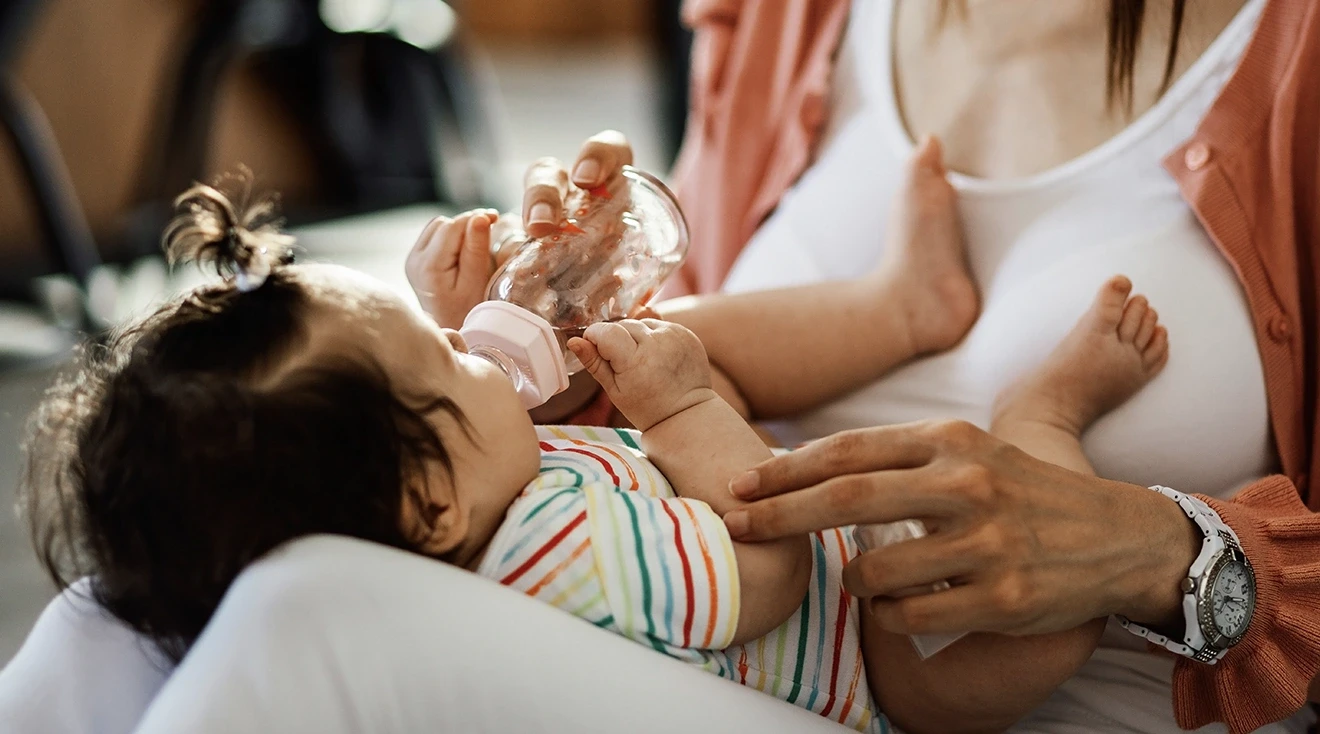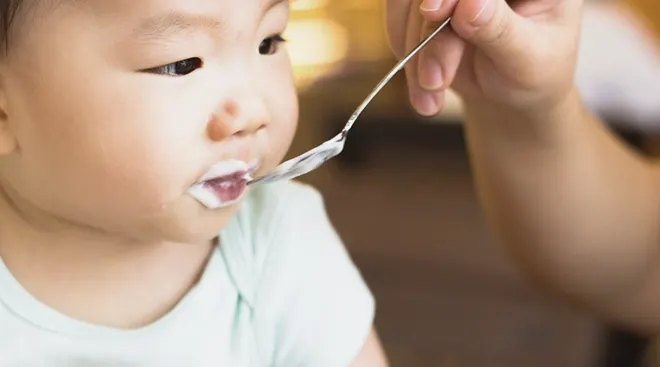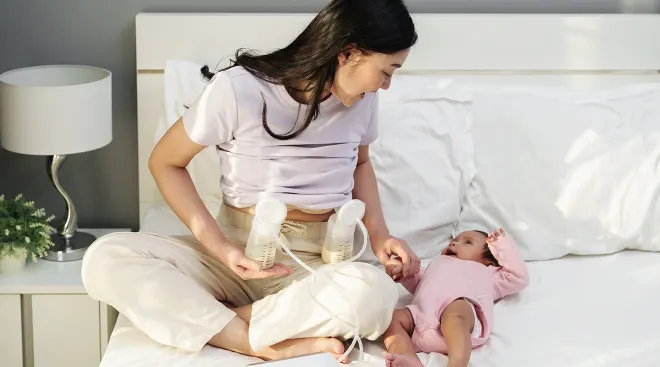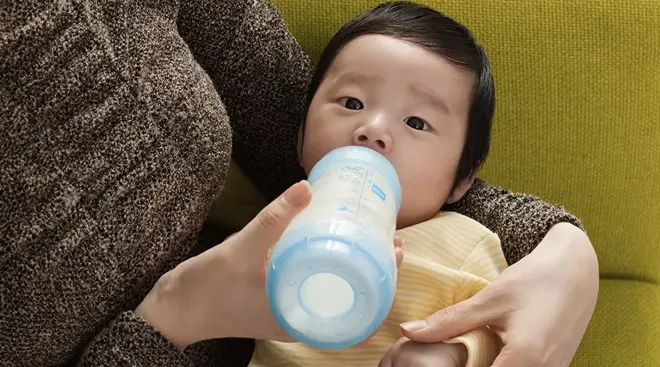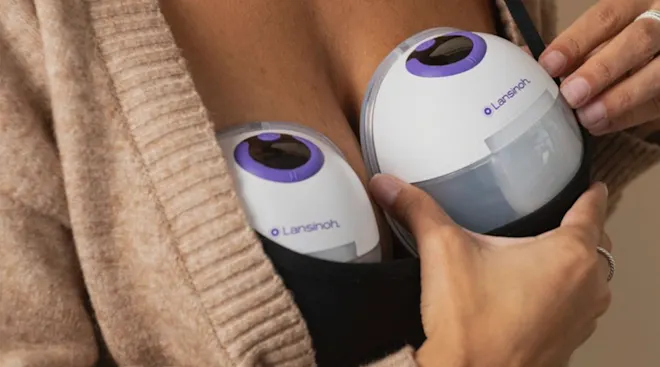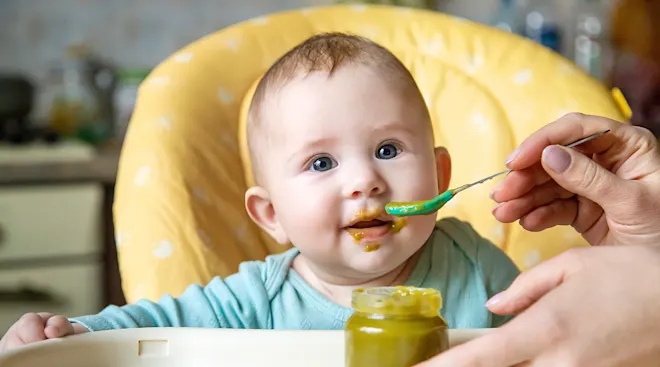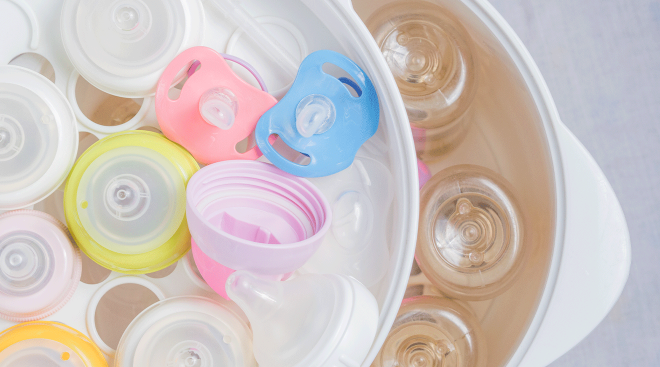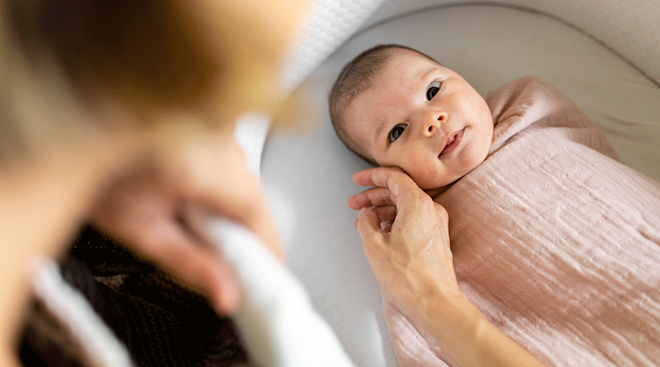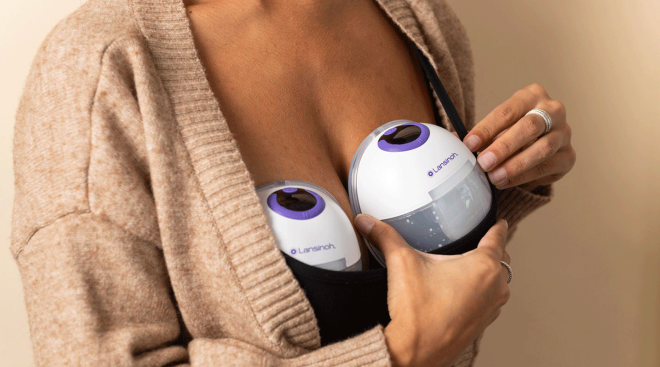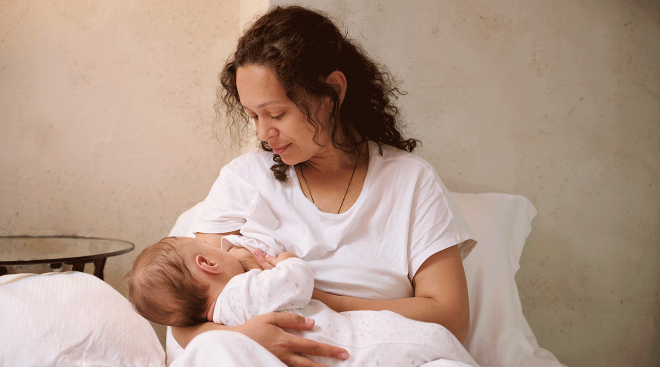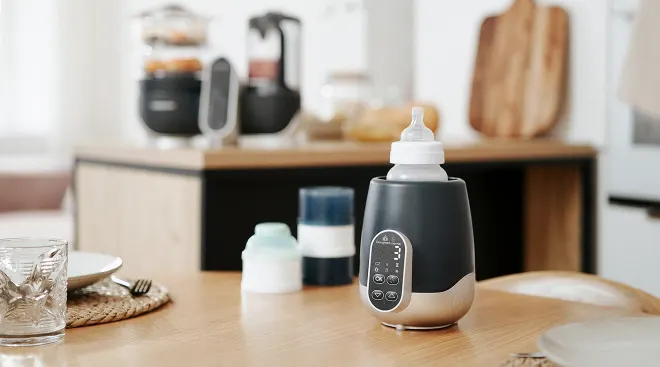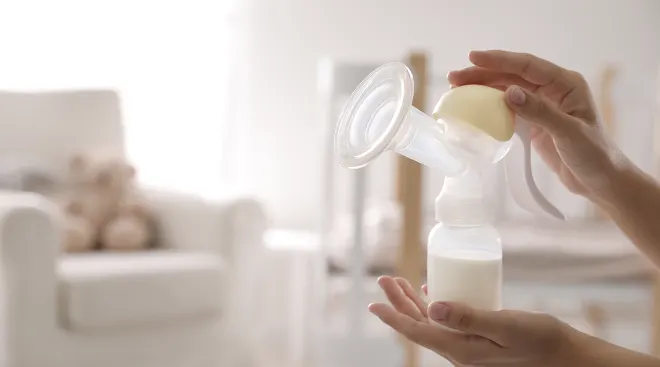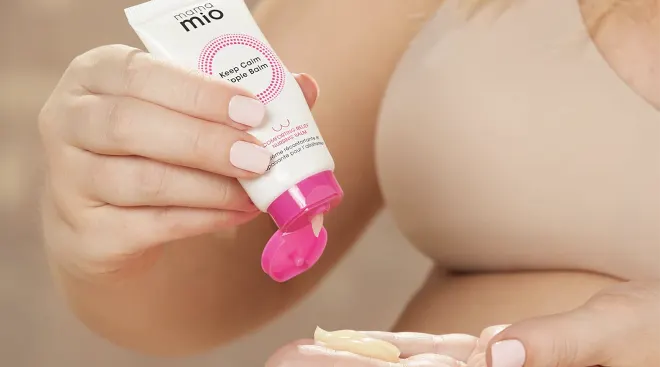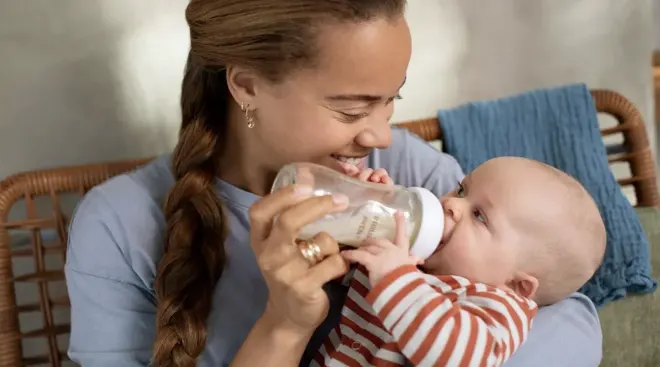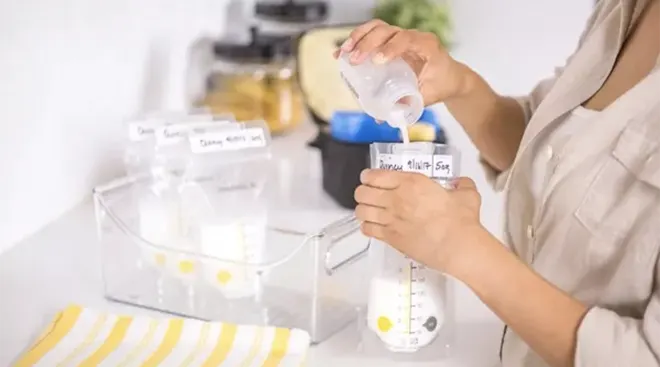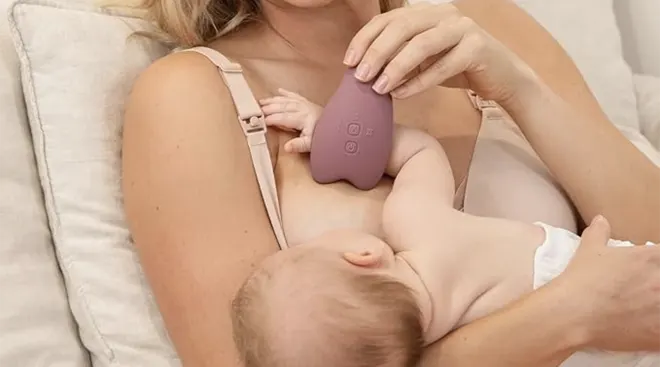When Can Babies Drink Water?
Hydration is a key part of health—in adulthood (especially during pregnancy) and in childhood. But what about infanthood? Can newborns drink water? It may surprise you to learn that the answer is actually no. For young babies, breast milk or formula serves as their source of hydration. Not only do infants not need water, but it may actually be dangerous for them if it’s given too soon. So when can babies have water? And how can you help them develop good hydration habits? Here’s when babies can drink water and how to add it to baby’s diet safely.
If you’re wondering, “when can babies have water?” the answer is when babies are around 6 months old, says Denise Scott, MD, an Oklahoma-based pediatrician and expert with JustAnswer. If baby was born earlier than full term, they shouldn’t have water until 6 months after what would have been their term delivery. This is because babies’ kidneys aren’t developmentally mature enough to handle water before this age (more on this below).
Wondering if baby can have water after you’ve introduced solids? The American Academy of Pediatrics recommends waiting until 6 months before giving baby solid foods. However, if baby starts to dig in before then, you should still wait until your little one is 6 months old before giving them water, Scott says, adding, “Breast milk or formula will provide all the water [baby] needs until then.”
Risks of giving baby water too early
Giving babies water before they’re 6 months old can actually be dangerous, due to the possibility of water intoxication. “Their bodies and kidneys are not yet mature enough to handle water,” Scott explains. “Drinking water can dilute their electrolytes, specifically the sodium, which can lead to hyponatremia (low salt).” This, in turn, can cause severe health problems such as weakness, seizures, brain damage and, in some cases, even death.
How to safely prepare baby formula with water
Caregivers should also be cautious of water intoxication when mixing formula and never attempt to dilute formula with water. “When mixing formula, it’s important to follow the instructions precisely,” says California-based pediatrician Tanya Altmann, MD, author of What To Feed Your Baby. “Too much water can dilute the nutrition and cause serious health problems.” Of course, if you’re not using ready-to-feed formula, it’s fine to mix powdered or condensed formula with either tap or bottled water—just make sure you follow the recommended amount listed in the instructions.
From 6 to 12 months, babies don’t actually need to drink water, but a few sips a couple of times a day will help them get accustomed to the taste. “It’s one of the healthiest habits to start early,” Altmann says. (You also don’t want them to drink too much, as a belly full of water might curb baby’s appetite for milk, which could compromise their nutrition.)
Older infants between 9 and 12 months can drink more—between four and eight ounces a day, Scott says. Once your child celebrates their first birthday and is eating solids regularly, it’s okay to let baby drink water freely, for a total of 4 cups of liquid (including water and cow’s milk) a day. Altmann and Scott say it’s best to offer baby water between meals and offer breast milk, formula or whole milk (if baby’s old enough) at mealtime. “Water should not replace a feeding,” Scott says.
Now that you know when babies can have water, you’re probably wondering how to go about giving water to baby—but there’s really no right or wrong answer. “Bottle, sippy cup, straw or even tiny sips from a regular cup is fine,” Altmann says, noting that bottles may be easiest for younger babies. “My mom used to use the cap from the bottle as a little cup to pour tiny sips into my boys’ mouths. They loved it! They laughed, sometimes spit some back, but got used to the taste of plain water as infants.”
A lack of water won’t dehydrate baby as long as they’re feeding well and gaining weight. However, baby may get dehydrated if they fall sick with a cold, the flu or another health problem. “When babies are sick they can get easily dehydrated if they aren’t [feeding] enough or if they’re losing fluids through vomiting or diarrhea,” Altmann says. Baby may also get dehydrated if they have a fever or are in a hot environment, Scott adds.
So how can you tell if baby is dehydrated? Call your pediatrician right away if:
- There are fewer wet and dirty diapers than usual
- Baby is lethargic, irritable or unusually tired and drowsy
- Baby isn’t making tears
- Baby has a dry mouth without saliva
- If the soft spot on top of baby’s head appears sunken
To help baby rehydrate, “you may need to breastfeed more frequently, give baby an electrolyte solution such as Pedialyte, or in more serious cases baby may need to be hospitalized for IV fluids,” Altmann says.
Whether you’re mixing it into powdered formula or letting baby take small sips once they’re old enough, what type of water you use—bottled or tap—is really up to personal preference. “Be sure to ask your pediatrician or pediatric dentist if your child needs extra fluoride,” Altmann says. If baby needs a boost, you can use bottled water that has added fluoride. If you use only tap water, note that you may notice slight white spots on your child’s teeth, a harmless condition called dental fluorosis. According to the American Dental Association (ADA), it won’t affect the health of teeth—and may even make teeth more resistant to decay. However, if you do use tap water and don’t have a filtration system, or if you get your water from a well, Scott says to consider getting it tested for lead or other chemicals. “If you boil water, it should be refrigerated within an hour after boiling,” she adds.
The bottom line? After they’re developmentally ready, there’s no harm in offering them small sips of water (with your pediatrician’s approval). At this stage, it’s really about getting them used to the taste rather than ensuring they stay hydrated. After all, infants who drink water become toddlers who drink water and, later, kids who drink water. “Drinking plain water is one of the healthiest habits you can start with baby," Altmann says. “How many adults do you know who don’t like the taste of plain water? It’s because they didn’t get used to drinking it as kids."
For any and all questions regarding when to give baby water, how much and what kind, don’t hesitate to reach out to your pediatrician. They’ll help you figure out when baby can have water safely. Just like learning to eat solids, learning to drink water is a process for most babies—but, once they’re old enough, stick with it and soon it’ll be a strong, healthy habit.
Please note: The Bump and the materials and information it contains are not intended to, and do not constitute, medical or other health advice or diagnosis and should not be used as such. You should always consult with a qualified physician or health professional about your specific circumstances.
Plus, more from The Bump:
Denise Scott, MD, is a pediatrician with JustAnswer and a pediatric endocrinologist based in Oklahoma with over 30 years of experience. Certified in culinary medicine, Scott also runs the blog Feed Future Health and is the author of Feed Your Child's Future Health: Prevent Disease before it Starts. She received her medical degree from the University of Texas Medical Branch and completed her residency at the University of Oklahoma Health Sciences Center, with a fellowship at the National Institutes of Health.
Tanya Altmann, MD, is a California-based pediatrician with over 20 years of experience, founder of Calabasas Pediatric Wellness Center and author of several parenting books, including What To Feed Your Baby. She also serves as an adjunct clinical professor at Children’s Hospital Los Angeles and Keck School of Medicine. She earned her medical degree from Sackler School of Medicine and completed her residency at University of California, Los Angeles.
Healhty Children (American Academy of Pediatrics), Starting Solid Foods, August 2022
Mouth Healthy (American Dental Association), Fluorosis
Learn how we ensure the accuracy of our content through our editorial and medical review process.
Navigate forward to interact with the calendar and select a date. Press the question mark key to get the keyboard shortcuts for changing dates.
































